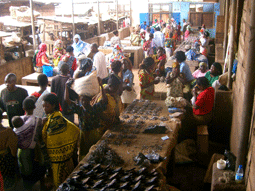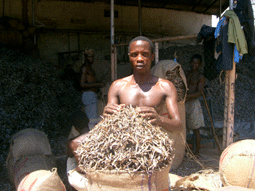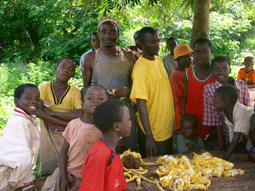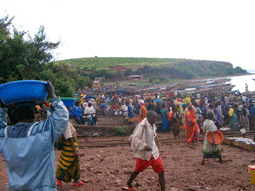Early Signs: Reports From a Warming Planet
Air Date: Week of March 24, 2006

Dagaa fresh from the lake, Katonga Beach. (Photo: Kate Cheney Davidson)
In the second of a series on climate change, Living on Earth travels to East Africa. The waters of Lake Tanganyika have warmed in recent years. Now some scientists are worried that that could be affecting a small fish that's a staple food for Tanzania. Jori Lewis reports.
Transcript
GELLERMAN: It’s Living on Earth. I’m Bruce Gellerman. The first European explorers of Africa were obsessed with finding the source of the Nile River, and, for a while, they believed they’d found it in Lake Tanganyika. They were wrong, but it was an honest mistake – the lake seems to go on forever. It’s 420 miles long. It’s the longest fresh water lake in the world, and the second deepest.
Lake Tanganyika is also home more than 350 species of fish. Many are endemic to the lake, which has another remarkable property: the water temperature is almost uniformly consistent even in the deepest part, 4,700 feet down. The difference from the surface temperature is only about 3 degrees centigrade.
But recent research suggests that global warming may be affecting this incredible body of water and the fish which millions of people in this poorest of regions depend upon for sustenance and survival. Today we continue our special series “Early Signs from a Warming Planet.” The series is a collaboration of the UC Berkley Graduate School of Journalism, salon.com and Living on Earth to document places around the world where concerns about climate change are already having an impact. Places like Lake Tanganyika where producer Jori Lewis begins her story.
[MARKET SOUNDS]
LEWIS: You can get just about anything at Kigoma’s market. Its maze-like warren of shops holds spices from Zanzibar, replacement batteries for broken cell phones, neon colored candies made from baobab seeds, and music from India and the Congo. They are small shops. Two steps take you from one to the next. And the market is covered by a tin roof that makes the whole place feel subterranean. As people pass by, sellers call out.
MAN: Habari. Jambo.

Fish halls of Mwanga Market, Kigoma. (Photo: Kate Cheney Davidson)
[Market Sounds]
LEWIS: Their calls compete with the tinny sounds of nearby bootleg music and movie stands and the rhythmic chopping of knife on fish.
LEWIS: Kigoma is on Tanzania’s far western border. It’s a place so far from the rest of the country that most Tanzanians don’t know anyone from there, have never visited, and never wanted to. If you ask people in Tanzania’s biggest city, Dar es Salaam, what they know about Kigoma, chances are they’ll only say one thing: dagaa.
Dagaa is a tiny sardine. They have it in other lakes, too, but Kigoma dagaa from Lake Tanganyika is widely acknowledged to be one of the best.
KANYOE: I’ve been selling fish here since 1956.

Dagaa fresh from the lake, Katonga Beach. (Photo: Kate Cheney Davidson)
KANYOE: Today there wasn’t a lot of dagaa.
LEWIS: He’ll try to make up for his losses by changing the size of the piles of dagaa he always sells for 100 shillings, or about 10 cents.
KANYOE: If there’s more fish, we make the pile higher. If there’s less, we make it smaller.
LEWIS: It’s just a basic function of supply. Sometimes the catch is good, and sometimes it isn’t. Fishermen say the catch depends on many things: the water’s temperature, the moon, the winds, good luck and magic. Kanyoe says maybe there is less dagaa today because fewer fishermen went out into lake. It could be. But fishermen and fish sellers aren’t the only ones observing the lake’s patterns. Scientists are watching the lake, too. In fact, some scientists are saying that maybe there’s just less dagaa in the lake altogether.

Worker Issa Athumani packing dried dagaa to ship to the Congo. (Photo: Kate Cheney Davidson)
LEWIS: Bard College biologist Catherine O’Reilly has been studying the lake’s ecosystem for over a decade. In 2003, her article in the scientific journal Nature showed that a warming trend in the region is affecting algae in the lake. This development may be putting the dagaa population at risk in a place where this little fish is the biggest thing going.
O’REILLY: There’s really no question the lake has warmed up. Point eight degrees C over the past 80 years.
LEWIS: Lakes depend on mixing to create algae. Mixing combines the nutrients on the bottom with the water on top. Tropical lakes like Tanganyika, though, have a hard time of it. Tanganyika’s waters separate into layers according to temperature and density, and most of the nutrients stay in the lake’s cold depths.
O’REILLY: The temperate lakes we’re all used to seeing, there’s a winter, and winter means that the water temperature will always cool down and mix completely. And in Lake Tanganyika that will never happen.
LEWIS: Tanganyika depends on dry season winds to stir things up. But as the water on top gets warmer, it makes it harder for that mixing to occur.
O’REILLY: Because of that we don’t have as many nutrients coming up from the deep water, and that appears to be having an impact on primary productivity of the lake. So we see fewer algae, and the algae are growing slower than they used to, so that suggests that there’s not as strong a base for the fish food web as there used to be.
LEWIS: And less algae means less zooplankton, the main food of dagaa, which itself is the main food of other fish in the lake. O’Reilly is not the only scientist concerned about Lake Tanganyika.
NKOTAGU: The lake is heavily threatened.
LEWIS: Hudson Nkotagu is a geologist at the University of Dar es Salaam and has spent a lifetime studying the lake. He says Tanganyika is threatened by several factors.
NKOTAGU: Pollution is coming from various sources. For example, in Tanzania, domestic waste. Excessive fishing and also use of inappropriate use of fishing gear. Another threat that is coming up recently is the climate change.
LEWIS: There’s no disagreement about temperature rise in the lake. Other published studies have also shown temperature increases, slowed wind speeds, and decreased algae growth in Tanganyika and other lakes in the area. Where there is some disagreement is whether we can already see a decline in the catch. But it’s a hard connection to track.
SEEMOO: We don’t know if the numbers are increasing or the numbers are dropping down. This gives a picture, the frame of the picture.
LEWIS: From his cluttered office across from the droning generator that provides intermittent electricity to the area, government statistician Alfon Seemoo has been tracking Kigoma region’s dagaa catch for nearly thirty years.
SEEMOO: ...the metric tons 50,002...
LEWIS: The numbers tell a story of boom and bust. You might expect for the catch to go up when there are more fishermen on the lake, and for them to go down when the numbers of fishermen decline. Sometimes that has happened, but in many years in Kigoma it has been just the opposite.
SEEMOO: You see, there is up and down due to the different factors.
LEWIS: Sometimes it just seems like luck. But one thing seems clear: a decline in dagaa would be a serious situation. Dagaa feeds the nation, and the nation is growing. In Kigoma, the poorest region of one of the poorest countries in Africa, dagaa is essential.
[LAPPING WATER]
LEWIS: Although there are over 300 species of fish in the lake, only dagaa shows up on the tables of even the poorest people. Only dagaa directly provides jobs to at least a million people in a place where there isn’t much work. And only dagaa swims in the lake in such abundance.
Despite such certainty, some fishermen are saying that over time their dagaa catches have gone down. Up the shore a couple of miles at the village of Kalalangabo, retired dagaa fisherman Myonge Seph fixes the cracks in his sons’ boats by patiently pounding in bits of cotton dipped in bright yellow palm oil.
[HAMMERING]
LEWIS: He says dagaa fishing is certainly not as good as it was 30 years ago when he was first starting out.

Myonge Seph (center with hat) surrounded by local children at Kalalangabo. (Photo: Kate Cheney Davidson)
LEWIS: Seph, a wiry man of 46, knows the moods of Lake Tanganyika. He knows, for instance, that there are at least four different types of winds that blow on the lake, and that the big ones come when the corn has babies. That wind starts the time of scarce dagaa. Seph knows the routine well after a lifetime on the lake. It has its ups and downs.
SEPH: We fish because we have no other job. Our grandfathers fished here. Our fathers fished here. We’ll fish here and pass it on to our children who will fish and pass it on again. It’s our legacy.
LEWIS: He also knows that dagaa are scarce when the moon is full, waning or waxing, which it is tonight. After all, fishing in these parts follows the path of the moon. When the moon is not full they go out into the open waters in search of a good place to catch dagaa, the silvery wonder the length of an index finger. The fishermen use kerosene lamps to attract zooplankton, dagaa’s main food. It’s a classic mouse trap. Lure the zooplankton and the dagaa will follow. And the darker the night, the more they are all seduced by the lights above. So, dagaa fishermen float on the waters of Africa’s deepest lake all night, waiting. Fishing dagaa is a ritual that has gone on for generations on the lake’s shores. And even though their methods of fishing differ, the spectacle remains the same. At night they light up the water.
Geologist Hudson Nkotagu grew up in the area around the lake and never gets tired of the sight.
NKOTAGU: You see in the night when the fishing is taking place. You see a big city. Maybe a big city with a lot of lights. Like maybe New York. It’s a comparison. But it’s actually fishermen who are actually fishing.
LEWIS: But when the moon is full or waxing or waning, there is too much light for their lamps to make a difference. Many fishermen take a few days off. Others just bring more lamps and go out further into the lake.
That’s not an option for the Kalalangabo fishermen who still use paddle boats and can’t go very far. Seph works underneath a shady tree on the beach where he and a few other men while away the day. And they will while away the night, too, since there won’t be any fishing for them on this bright night.
LEWIS: But there are fishermen who are better off and can go out deeper into the lake. Many of those fishermen fish from Katonga beach, just south of Kigoma.
[JAFARI SPEAKING IN LOCAL DIALECT]

Morning at Katonga Beach (Photo: Kate Cheney Davidson)
JAFARI: The water was a little warm today and there were few waves. It was very good.
LEWIS: He’s a small man, just over five feet tall, and at 50 years old has a gruff voice from long nights on the water.
JAFARI: My father was a fisherman and I inherited the trade from him. And my grandfather was also a fisherman.
LEWIS: Jafari says that the catch now is much better than in the old days. But for him the catch may be better than ever for a reason. Unlike Myonge Seph’s family at Kalalangabo, Jafari has gotten to fish with better lights, and uses a boat with an outboard motor. The engine lets him go out much further than his father was able to go three decades ago when they were fishing closer to the shore.
[RAIN]
LEWIS: It starts to rain and people unfold their umbrellas. Jafari pulls a threadbare overcoat closer over his wet clothing. He likes fishing, and says it gives him enough money to live. Most fishermen make more money than farmers. But they find it difficult to save any money when the catch varies season-to-season, and even day-to-day. Despite the good catch these days, Jafari is not happy his adult son has followed him into the water.
JAFARI: This life is too tough. He can’t do it. I’ve decided to send him to school so he can get an education. I got stuck in this job and I missed a chance to go to school.
LEWIS: It’s a common refrain. Everyone fishes, but no one wants his sons to have to.
[ELIAS RAP SONG]
LEWIS: It stops raining and, just twenty paces away from Jafari’s boat, a kid begins making turntable noises. His audience is a group of women and children who have started to spread dagaa on the sand to dry.
[RAP SONG]
LEWIS: People stop their work to cheer him on.
[CHEERING]
LEWIS: It’s a song about living and getting money and not getting HIV.
LEWIS: He’s 17 but looks 12, and is going back to school after break. He’s lucky, though. High school in Tanzania is not free, and most people can’t afford it. After all, the area around Tanganyika is like a one-factory town. Except, there’s no factory. There is only the lake: 420 miles long, nearly a mile deep, and with seemingly enough fish in its depths to support the over ten million people living on its shores.
[RAP SONG]
LEWIS: Most fishermen say it’s impossible for the dagaa to ever permanently go away. They know there are periods of plenty and periods of scarcity. During periods of scarcity, the lake’s lights darken. Some fishermen go out anyway to look for dagaa during those times. They go out again and again, waiting and watching.
[LAPPING WATER]
LEWIS: The fishermen say the dagaa always come back. They always have before, and most people can’t imagine that this cycle could ever break down. But this deep and ancient lake is changing, and not everyone will be able to change with it.
[CALL TO PRAYER]
LEWIS: Many fishermen aren’t going out tonight at Katonga. With the moon gathering strength, even with their big motors and plentiful lights they know they might not have good luck. But one group of intrepid fishermen is leaving early.
Mlema Musa and his crew are loading in several lights and canisters of gasoline. He connects the fuel pump to his 40 horsepower Yamaha motor. Musa bums a few cigarettes. Ignoring the gasoline, he lights one before casting off. Smoking helps pass the time, he says, and keeps him warm. They are going a little over a mile out tonight to a place where another fisherman got lots of dagaa the night before. How much they’ll get, no one can say.
MUSA: I can’t really predict how it’s going to be. We’ll know when we get there.
[MOTORBOAT SOUND AGAINST LAPPING WATER AND CALL TO PRAYER UP]
LEWIS: For Living on Earth, I’m Jori Lewis.
 |
 |  |  |
Links
To see a print version of this story, and other reports in this series, click here
Living on Earth wants to hear from you!
Living on Earth
62 Calef Highway, Suite 212
Lee, NH 03861
Telephone: 617-287-4121
E-mail: comments@loe.org
Newsletter [Click here]
Donate to Living on Earth!
Living on Earth is an independent media program and relies entirely on contributions from listeners and institutions supporting public service. Please donate now to preserve an independent environmental voice.
NewsletterLiving on Earth offers a weekly delivery of the show's rundown to your mailbox. Sign up for our newsletter today!
 Sailors For The Sea: Be the change you want to sea.
Sailors For The Sea: Be the change you want to sea.
 The Grantham Foundation for the Protection of the Environment: Committed to protecting and improving the health of the global environment.
The Grantham Foundation for the Protection of the Environment: Committed to protecting and improving the health of the global environment.
 Contribute to Living on Earth and receive, as our gift to you, an archival print of one of Mark Seth Lender's extraordinary wildlife photographs. Follow the link to see Mark's current collection of photographs.
Contribute to Living on Earth and receive, as our gift to you, an archival print of one of Mark Seth Lender's extraordinary wildlife photographs. Follow the link to see Mark's current collection of photographs.
 Buy a signed copy of Mark Seth Lender's book Smeagull the Seagull & support Living on Earth
Buy a signed copy of Mark Seth Lender's book Smeagull the Seagull & support Living on Earth

